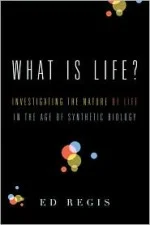Ed Regis' WHAT IS LIFE: INVESTIGATING THE NATURE OF LIFE IN THE AGE OF SYNTHETIC BIOLOGY
Book review by Dennis D. McDonald
In this fascinating and accessible book Ed Regis concludes that the maintenance of metabolic processes is really the primary indicator of “life.” But by the time that point is reached in the book, it doesn’t really matter.
What matters is that Regis has given us a wide-ranging view of “synthetic biology” that touches on chemistry, biology, genetics, heredity, evolution, natural selection, and the backgrounds of a diverse set of scientific researchers interested in creating a synthetic cell.
I’ll admit I don’t get too hung up on the question of “what is life?” I certainly appreciate the moral, religious, and legal implications of the question, having participated, for example, in the legal processes surrounding the death of a terminally ill friend. At one point in Regis’ book he does turn his attention to death after considering various definitions of life, but that section is not as strong as the others, perhaps because he doesn’t go into as much detail as he does on other “life-related” topics.
Oneinteresting part of the book is the author’s consideration of DNA and reproduction and how there have been serious questions raised about the primacy of the double helix in driving the generation and maintenance of life. In my own halting attempts to learn more about genetics in recent years I have become more aware of the complexities of reproduction, heredity, and natural variation, certainly more so than when I first learned about DNA in high school.
Perhaps most important is my personal conclusion that, as we learn scientifically more and more about the mechanisms of life, the boundaries between “life,” non-life,” and “death” become more and more fuzzy. That doesn’t mean I value life any less, but it does suggest that efforts to control, legislate, and limit certain types of scientific research are bound to fail.
This is a good, thoughtful, and well written book. My only complaint concerns the paucity of illustrations. The picture of the Krebs Cycle is nice, and the molecular model that follows it also nice (though unlabeled), but throughout the book there are many references to molecular structure and cellular components that cry out for illustrations. On balance, though, that author’s intellect, writing style, and clarity make this book both thought-provoking and insightful.
Review copyright (c) 2009 by Dennis D. McDonald. To find more reviews like this scroll down. To find out more about my consulting services go here.

